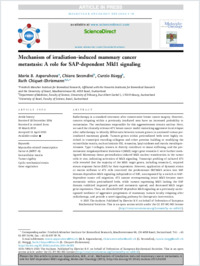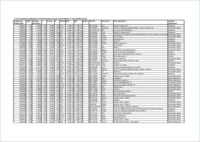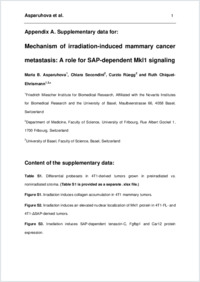Mechanism of irradiation-induced mammary cancer metastasis: A role for SAP-dependent Mkl1 signaling
- Asparuhova, Maria B. Friedrich Miescher Institute for Biomedical Research, Affiliated with the Novartis Institutes for Biomedical Research and the University of Basel, Switzerland
- Secondini, Chiara Department of Medicine, Faculty of Science, University of Fribourg, Switzerland
- Rüegg, Curzio Department of Medicine, Faculty of Science, University of Fribourg, Switzerland
- Chiquet-Ehrismann, Ruth Friedrich Miescher Institute for Biomedical Research, Affiliated with the Novartis Institutes for Biomedical Research and the University of Basel, Switzerland - University of Basel, Faculty of Science, Basel, Switzerland
-
30.04.2015
Published in:
- Molecular Oncology. - 2015, vol. 9, no. 8, p. 1510–1527
Myocardin related transcription factor A MRTF A
Extracellular matrix
Tumor rigidity
Cyclic mechanical strain
Gene regulation
English
Radiotherapy is a standard treatment after conservative breast cancer surgery. However, cancers relapsing within a previously irradiated area have an increased probability to metastasize. The mechanisms responsible for this aggressiveness remain unclear. Here, we used the clinically relevant 4T1 breast cancer model mimicking aggressive local relapse after radiotherapy to identify differences between tumors grown in untreated versus preirradiated mammary glands. Tumors grown within preirradiated beds were highly enriched in transcripts encoding collagens and other proteins building or modifying the extracellular matrix, such as laminin-332, tenascins, lysyl oxidases and matrix metalloproteinases. Type I collagen, known to directly contribute to tissue stiffening, and the pro-metastatic megakaryoblastic leukemia-1 (Mkl1) target gene tenascin-C were further investigated. Mammary tissue preirradiation induced Mkl1 nuclear translocation in the tumor cells in vivo, indicating activation of Mkl1 signaling. Transcript profiling of cultured 4T1 cells revealed that the majority of the Mkl1 target genes, including tenascin-C, required serum response factor (SRF) for their expression. However, application of dynamic strain or matrix stiffness to 4T1 cells converted the predominant SRF/Mkl1 action into SAP domain-dependent Mkl1 signaling independent of SRF, accompanied by a switch to SAP-dependent tumor cell migration. 4T1 tumors overexpressing intact Mkl1 became more metastatic within preirradiated beds, while tumors expressing Mkl1 lacking the SAP domain exhibited impaired growth and metastatic spread, and decreased Mkl1 target gene expression. Thus, we identified SAP-dependent Mkl1 signaling as a previously unrecognized mediator of aggressive progression of mammary tumors locally relapsing after radiotherapy, and provide a novel signaling pathway for therapeutic intervention.
- Faculty
- Faculté des sciences et de médecine
- Department
- Médecine 3ème année
- Language
-
- English
- Classification
- Biological sciences
- License
-
License undefined
- Identifiers
-
- RERO DOC 257288
- DOI 10.1016/j.molonc.2015.04.003
- Persistent URL
- https://folia.unifr.ch/unifr/documents/304543
Other files
Statistics
Document views: 148
File downloads:
- pdf: 182
- Supplementary material: 139
- Supplementary material: 172


